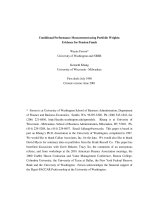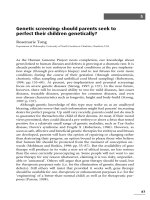Showing possibility using should
Bạn đang xem bản rút gọn của tài liệu. Xem và tải ngay bản đầy đủ của tài liệu tại đây (8.23 KB, 1 trang )
Showing possibility using should
We can use should to say that something is probable because it is logical or normal.
I am stronger than him, so I should be able to beat him. (It is a logical possibility.)
She has been working on that project for well over two weeks. She should be able to finish in time.
If the sky is clear, you should be able to see Mount Everest from Tiger Hill.
Aparna should be here before 7.30 – she left office at 6 o’clock.
‘I am spending the weekend with my parents.’ ‘That should be nice.’
He has worked hard. He should be able to pass the test.
Should have + past participle
This structure is used to talk about past events that did not happen.
I should have finished that report yesterday. (It was necessary for me to finish that report yesterday, but I
couldn’t.)
You should have asked my permission before using my computer. (= It was necessary for you to ask my
permission, but you didn’t do that.)
Should have + past participle is also used to talk about past events which may or may not have happened.
9 am. Alice should have left for office. (We don’t know whether this particular event took place, but it is a
possibility.)
Should not have + past participle
The structure should not have + past participle is used to talk about unwanted things that happened.
You shouldn’t have shouted at her. It really upset her.
Should not have + past participle is also used to talk about negative possibilities.
It is only 4.30. She shouldn’t have left her office now.
Stay on top of your writing! Download our grammar guide from www.englishgrammar.org to stay up-to-date.
Powered by TCPDF (www.tcpdf.org)









